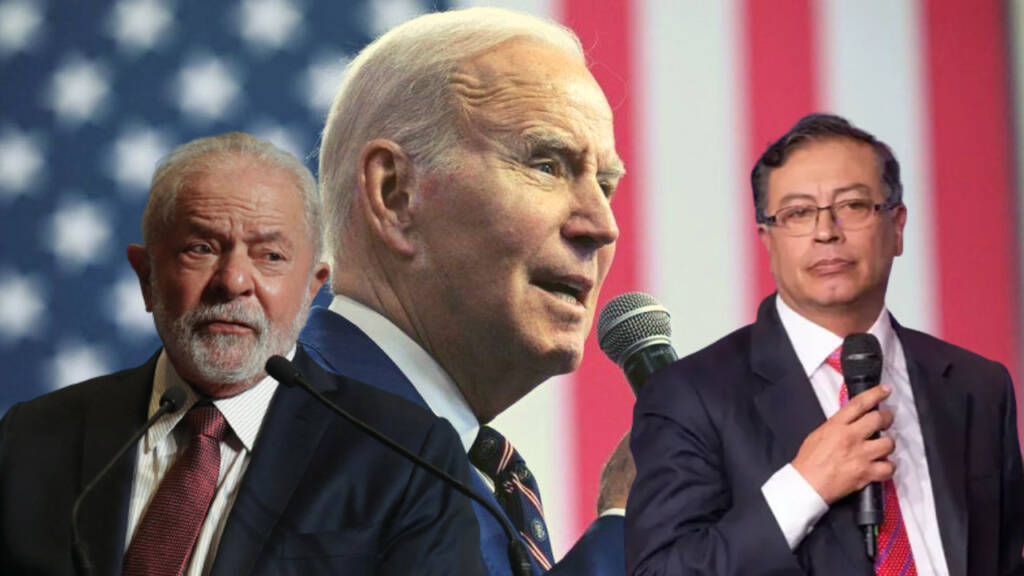The United States has been losing influence in Latin America. One factor is the changing global, political and economic landscape. As China has become a more dominant player in global affairs, it has increasingly sought to expand its influence in Latin America through economic investment and infrastructure projects.
This has given Latin American countries more options and bargaining power in their relationships with the United States. Another factor is the history of US intervention and interference in Latin American affairs, which has left a legacy of mistrust and resentment in many countries in the region.
The emergence of rival players like China and Russia in its backyard has sent shivers through many American leaders. They are leaving no stone unturned to maintain their dwindling influence. But it seems like the situation would only worsen for the US in the coming days.
Read more: Why is the US so hell bent on wooing Colombia?
Recently, Petrobras, a Brazilian government-owned multinational company and Colombia’s Ministry of Mines and Energy met to discuss partnerships in South America.
On March 9, the CEO of Petrobras, Jean Paul Prates, met the Minister of Mines and Energy of Colombia, Irene Vélez Torres, during CERAWeek programming in Houston, Texas (USA).
Jean Paul Prates commented on the challenges that bring Brazil and Colombia together as countries rich in renewable resources and the responsibility to preserve the Amazon Forest, the largest tropical forest in the world, which occupies the territory of both countries.
The CEO of Petrobras highlighted Petrobras’ environmental projects for the protection of the forest and reinforced the need to combine efforts by the energy industry and governments in favour of environmental preservation. He cited the Petrobras operation in Urucu, in the Amazon, as a case of success in developing activities in the oil and gas industry and preserving the environment.
The two authorities also discussed prospects for developing natural gas production in the Tayrona block, in Colombia, a priority area that Petrobras owns in partnership with Ecopetrol.
Read more: US Issues Warning Against Mexico But Forgets to Look in the Mirror
The discovery increases prospects for the development of a new exploration and production frontier in Colombia and paves the way for new initiatives to make better use of oil and gas reserves in the region.
US dreams get shattered
Now, the US has traditionally been a key player in the Latin American region, but in recent years, its influence has waned, particularly with the fallout with Venezuela and Brazil.
In light of this, the US has turned its attention to Colombia, a country that has long been seen as an important ally in the region. The US has been working hard to woo Colombia in an attempt to maintain its presence in Latin America and to counter the growing influence of China and Russia in the region.
The strengthening of links between Colombia and Brazil, a country that is currently realigning its strategy with Russia, would therefore undoubtedly enrage US officials.
Brazil and the United States’ relationship has deteriorated to an unparalleled degree. Brazil’s President Lula da Silva started moving closer towards the Russian camp just one month after his presidency. The Brazilian ambassador to Russia, Rodrigo de Lima Baena Soares, announced that the nation is looking to receive investments in its energy sector from the Russian gas giant Gazprom.
Besides, in a strong display of defiance against US diktats, Brazil showed signs to recognize Venezuela’s President Nicolas Maduro. On February 24th, Manuel Vadell, Venezuela’s Ambassador-designate to Brazil, presented his credentials to María Laura da Rocha, the Secretary General of Foreign Affairs. The two officials discussed the possible restoration of bilateral relations and the reopening of embassies, as per the Brazilian Foreign Ministry.
It should be remembered that the US administration has pushed other South American nations to support US sanctions against Venezuela and declare Maduro to be an illegitimate leader. As a result, the US and Brazil had a falling out over Brazil’s choice to forge ties with Venezuela.
Additionally, even after being urged by the US to refuse Iranian ships the authority to dock, citing exclusive American prohibitions against Tehran, Brazil permitted the Iranian ships to land at the Rio de Janerio Port, thereby further exacerbating the bilateral strains between Washington and Brasilia.
Washington is undoubtedly displeased by the strengthening ties between Brazil and Colombia. It’s possible that Bogota may soon begin establishing relationships with important US’ adversaries like Russia and Iran, following in the footsteps of Brazil. Colombia has already begun to signal that it might not always be controlled by the United States. Colombia and Venezuela recently signed a deal to relaunch bilateral trade during a ceremony on a border bridge, much to the annoyance of the United States.
It should be noted that Colombia was the last thread on which the US’ dreams were hung. The end of American hegemony in Latin America may very well be written if Bogota begins to distance itself from Washington. And its growing partnership with Brazil is an indication that Colombia too will venture on the quest to erode the dominance of the US in Latin America. One thing is certain and that is Brazil’s friendship with Colombia will prompt Bogota to reexamine its foreign policy goals.
https://www.youtube.com/watch?v=B_R20BCgito
